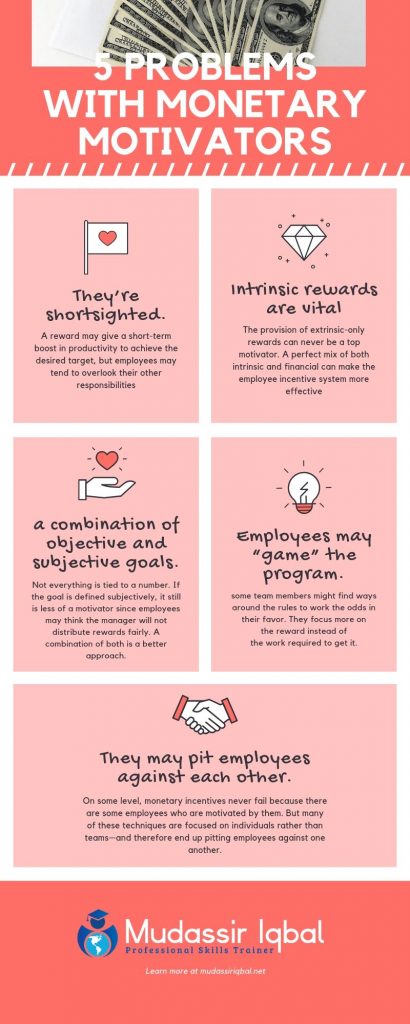The Problems With Monetary Motivators
 Many business owners think that getting peak performance from employees is simple—just tie cash rewards to goals. This technique is a mistake. One size doesn’t fit all,
Many business owners think that getting peak performance from employees is simple—just tie cash rewards to goals. This technique is a mistake. One size doesn’t fit all,

as every human being is at a different stage of their life and will be motivated by different rewards and recognition. The biggest challenge in creating the right initiatives can be the human resource department, which may suggest this kind of scheme simply to match its KPIs.
Here are some reasons why monetary rewards are not the answer for inspiring motivation:
1. They’re shortsighted.
A reward may give a short-term boost in productivity to achieve the desired target, but employees may tend to overlook their other responsibilities (and the reason they are getting paid in the first place). A recent paper by the Incentive Research Foundation notes that “There is growing academic evidence that investments in non-cash rewards can elicit equal levels of performance for less cost than cash.”
2. Intrinsic rewards are vital.
The provision of extrinsic-only rewards can never be a top motivator. A perfect mix of both intrinsic and financial can make the employee incentive system more effective. It’s important to pay consideration to how employees respond to intrinsic factors such as a sense of accomplishment and the feeling associated with succeeding a challenging task. Even the opportunity to undertake specific training at work, and learn or enhance some skills is a reward in itself.
Highlighting the inherent value in learning and growth can successfully motivate employees to keep growing and progressing at work. Moreover, German and Swiss researchers found that gifts are more motivating to employees than cash bonuses. Also, appreciation from the boss may matter more than any incentive, when it comes to employee motivation.
3. You need a combination of objective and subjective goals.
Not everything is tied to a number. Many business owners try to define the organization’s goal with a complicated numeric formula that often confuses employees and motivates none. If the goal is defined subjectively, it still is less of a motivator since employees may think the manager will not distribute rewards fairly. A combination of both is a better approach.
4. Employees may “game” the program.
An organization’s incentive system to offer rewards and recognition to employees when they go above performance standards serves as an important motivation factor. However, keep in mind that some team members might find ways around the rules to work the odds in their favor. They focus more on the reward instead of the work required to get it.

This reminds me of a story shared by a manager in my last coaching session. We all appreciate being able to park as close to our office as possible. His company offered a parking space for one month to the employee who brought in the most paper for recycling. On the first day of the month, my student brought in a large number of newspapers—but to his surprise saw a person bringing in an amount of paper that seemed humanly impossible for one person to collect in a month. Turns out that the co-worker purchased it all at a used bookshop for a fraction of the price to help ensure getting the space. This leads to my final point about monetary incentives…
5. They may pit employees against each other.
On some level, monetary incentives never fail because there are some employees who are motivated by them. But many of these techniques are focused on individuals rather than teams—and therefore end up pitting employees against one another.
As already mentioned, extrinsic rewards aren’t the only motivator. Companies should focus more on productive rewards like training programs for top performers; even free training at the workplace can offer new opportunities to staff. It’s not difficult to offer learning and development programs as a reward, and education/training opportunities can be presented as incentives to individuals and teams (for the team, you can offer rewards for a team project when it’s delivered well and on time).
Also, noticing an employee doing something well—and giving them timely feedback about it—can make them happier with their work and more driven than before. From my personal experience, rewards that come as a surprise have an even greater impact on employee morale and motivation.

